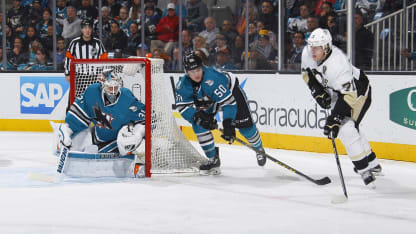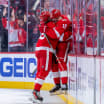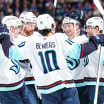3. HOME-ICE ADVANTAGE
Having the backing of a vocal crowd for the first time in the series will help, but the Sharks also have to do their part to utilize the advantages of playing at home, where they are 7-2 in the playoffs. Sharks coach Peter DeBoer didn't do a lot to get or get away from certain matchups on the road. Having the last change at home will give him an opportunity to dictate more.
Defenseman Marc-Edouard Vlasic practically begged Friday to play more against Sidney Crosby's line. DeBoer also can get Pavelski and Joe Thornton away from Penguins defenseman Kris Letang and partner Brian Dumoulin, which might help those two produce after they were held scoreless in the first two games.
"You get the matchups you want and we've used that throughout this playoff to our advantage," Thornton said. "We've been really good at home this postseason, so we're looking to continue that tomorrow."
4. FILLING IN FOR HERTL
Forward Tomas Hertl was one of the Sharks' best skaters in Game 2 after scoring a power-play goal in Game 1, but did not practice Friday and will not play in Game 3 because of a lower-body injury.
Losing Hertl, who appeared to injure his left leg on a hit from Patric Hornqvist in the third period of Game 2, is a big blow.
DeBoer said either Dainius Zubrus, who was a healthy scratch for Game 2, or Melker Karlsson will take Hertl's spot on the top line with Joe Pavelski and Joe Thornton.
"Next man up for us," DeBoer said. "He's arguably been maybe our best player for the first two games, but injuries are no excuse this time of year. We've got someone that will go in for him and we'll roll out there and be ready to play."
5. DRAW MORE POWER PLAYS
Through the first two games, the Sharks have had three power plays and scored on one of them. That one goal raised their postseason conversion rate to 27.7 percent and emphasizes their need to draw more power-play opportunities.
The problem is the Penguins don't take a lot of penalties because they have the puck so much. They were shorthanded 13 times total in the Eastern Conference Final against the Tampa Bay Lightning and have faced one power play in five of their past eight games.
Eighteen of the Sharks' 66 playoff goals (27.3 percent) have come on the man-advantage, so that's a significant chunk of their offense that is being limited.
"We're not playing with the puck enough," Shark center Logan Couture said. "We're not forcing them to play in their zone tired, and that's when penalties usually happen, at the end of long shifts. That's when hooking, slashing and holding happens. It's up to us as players to force them to play defensive."


















